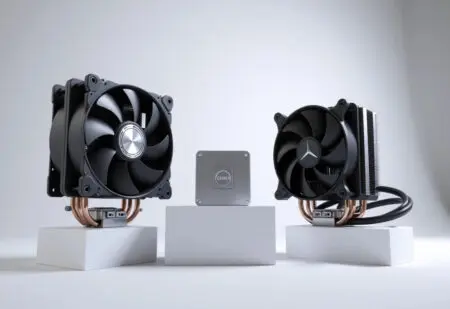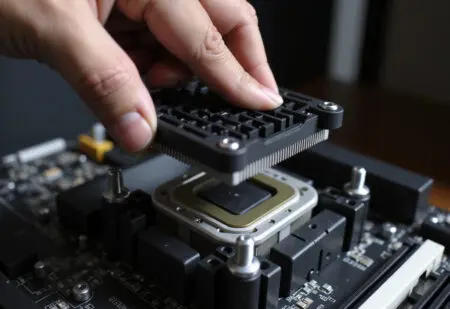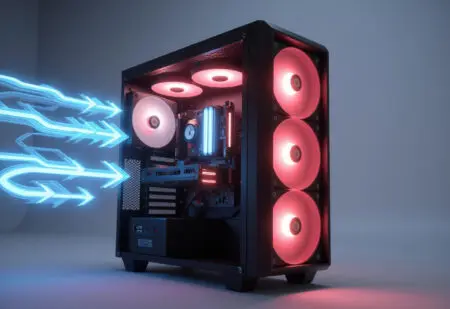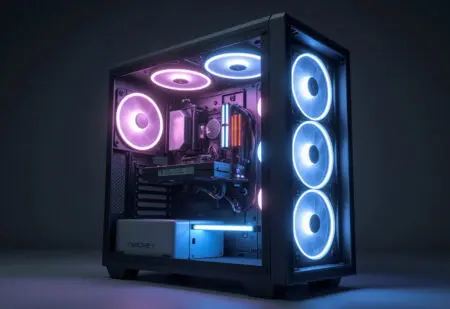Did you know that the shiny new 16-core CPU your friend just bought might actually perform worse in some games than a more modest 6-core processor? It sounds completely backward, I know. For years, the tech world has drilled into us that more is always better. More megapixels, more gigabytes, and, of course, more cores. But when we’re talking about how many cores for gaming, the answer is far more interesting and nuanced than just picking the biggest number on the box.
I’ve been building my own gaming PCs for over a decade, and I’ve fallen into that “more is better” trap myself. The truth is, building a great gaming rig is an art of balance. It’s about understanding where your money makes a real, tangible difference in your frame rates and overall experience. The optimal core count for you depends heavily on your budget, the types of games you play, and what else you do with your computer when you’re not gaming.
So, let’s cut through the marketing jargon and figure this out together.
More in CPUs & Processors Category
Is Intel Core i7 Good for Gaming
Is Intel Core i5 Good for Gaming
Is Intel Core i3 Good for Gaming
What Exactly is a CPU Core and Why Does it Matter for Gaming?
Before we can decide how many cores we need, it’s crucial to understand what they actually do. Think of your CPU (Central Processing Unit) as the brain of your computer. Following that analogy, a core is like an individual brain lobe capable of working on a specific task. A single-core CPU can only work on one task at a time. A dual-core CPU can work on two tasks simultaneously, a quad-core on four, and so on.
It’s like an assembly line. One worker (core) can build a product from start to finish. But if you have four workers (a quad-core), you can have them all working on different products at the same time, dramatically increasing your output.
Then you have threads. You’ll often see a CPU described as “6 cores, 12 threads.” A thread is essentially a virtual core. Technologies like Intel’s Hyper-Threading and AMD’s Simultaneous Multithreading (SMT) allow a single physical core to work on two tasks (threads) at once. It’s like a worker who’s really, really good at multitasking. While it’s not as effective as having two separate physical cores, it significantly boosts performance in tasks that can be broken down into many smaller pieces. This fundamental design is at the heart of how microprocessors work and why the core count discussion is so important.
For gaming, the CPU has to handle a ton of jobs: running the game’s logic, calculating physics, managing enemy AI, processing audio, and sending instructions to your graphics card. The more cores you have, the more of these jobs can be handled at the same time. However, there’s a catch—the game itself has to be designed to effectively use all those workers on the assembly line.
Let’s Bust a Myth: Is More Cores Always Better for Gaming?
The short answer is a resounding no. This is probably the biggest misconception I see on forums and in conversations with new PC builders. While having more cores is never a bad thing, it’s subject to the law of diminishing returns, especially in gaming.
I remember upgrading from a 4-core, 8-thread Intel CPU to an 8-core, 16-thread AMD Ryzen processor a few years back. I was expecting a monumental leap in gaming performance. I thought my frame rates in my favorite shooter would double. The reality? I saw maybe a 5-10% improvement in most titles. I was honestly pretty disappointed at first, but it taught me a valuable lesson: for gaming, once you have enough cores, having more cores doesn’t move the needle very much.
The reason is that game development is incredibly complex. It’s not easy to design a game engine that can effectively spread its workload across a huge number of cores. Most games have a “main thread” that handles the most critical tasks, and this thread often relies on the raw speed of a single core. Consequently, after a certain point—around 6 or 8 cores for most modern games—adding more cores provides very little extra gaming performance. The rest of the cores simply sit there, unused by the game.
So, How Many Cores Do You Realistically Need in 2025?
Now we get to the heart of the matter. The optimal number of cores depends almost entirely on your specific use case. What’s perfect for a hardcore streamer is complete overkill for someone who just wants to play the latest single-player titles.
The Sweet Spot: Are 6 Cores Enough for Modern Gaming?
Absolutely, yes. For the vast majority of people building a PC primarily for gaming, a modern CPU with 6 cores and 12 threads is the undisputed sweet spot. It represents the pinnacle of value, offering fantastic performance without breaking the bank.
A 6-core processor provides more than enough power to handle the latest and most demanding games. Simultaneously, it leaves you with enough headroom to run essential background applications without impacting your gaming experience. You can have Discord, a music app, and a few browser tabs open without causing any stutters. I’ve personally tested this configuration extensively, and it’s a smooth and reliable experience across the board.
Here are just a few examples of popular and demanding games that run flawlessly on a modern 6-core CPU:
- Baldur’s Gate 3
- Cyberpunk 2077: Phantom Liberty
- Call of Duty: Modern Warfare III
- Apex Legends
- Starfield
Unless you have very specific needs, a 6-core CPU is the smart, efficient, and budget-friendly choice for a top-tier gaming experience.
Stepping It Up: When Should You Consider 8 Cores?
If a 6-core CPU is the sweet spot, then an 8-core processor is the “enthusiast’s choice.” This is where you should look if you’re doing more than just gaming. An 8-core, 16-thread CPU is the ideal pick for the aspiring or established streamer, the content creator, or the gamer who loves to multitask heavily.
The extra two cores and four threads provide significant breathing room for demanding background tasks. For example, if you want to play a AAA title at high settings while simultaneously streaming your gameplay in high quality on Twitch or YouTube, those extra cores will ensure both your game and your stream run smoothly. The encoding process for streaming video is very resource-intensive, and having dedicated cores to handle that workload prevents your in-game performance from taking a nosedive.
Furthermore, an 8-core CPU offers a bit more “future-proofing.” While that term is often overused, there is some truth to it here. As next-generation consoles like the PlayStation 5 and Xbox Series X both use 8-core CPUs, game developers are increasingly optimizing their games to take advantage of more threads. While a 6-core CPU is still fantastic today, an 8-core chip gives you that extra peace of mind that you’ll be set for years to come. Just don’t expect it to magically double your frame rates overnight.
Is There Any Point to 12 or 16 Cores for a Gaming PC?
Let’s be perfectly clear: for a PC used exclusively or primarily for gaming, there is virtually no benefit to having 12, 16, or even more cores. The performance difference between an 8-core CPU and a 16-core CPU in most games is often statistically insignificant. Sometimes, the 8-core chip might even be slightly faster if it has a higher clock speed.
So, who are these high-core-count CPUs for? They are for “prosumers” and professionals who use their PC as a workstation that also happens to play games. If your day job involves heavy video editing in 4K or 8K, 3D modeling and rendering, software compilation, or running multiple virtual machines, then these CPUs are a game-changer for your productivity. These tasks are designed to use every single core you can throw at them, and a 16-core processor can cut rendering times in half compared to its 8-core counterpart.
For gaming, however, it’s like buying a massive semi-truck just to go grocery shopping. Sure, it’ll get the job done, but it’s wildly inefficient, expensive, and not the right tool for the task.
What About the Other Half of the Equation? Clock Speed and IPC
Focusing only on core count is a classic mistake because it’s only half the story. To truly understand CPU performance, you have to consider two other critical factors: clock speed and Instructions Per Clock (IPC).
Why is Clock Speed (GHz) Still So Important?
Clock speed, measured in gigahertz (GHz), is essentially how fast each individual core can operate. If a core is a worker on an assembly line, clock speed is how quickly that worker can perform their individual actions.
As we discussed earlier, many games still rely heavily on a single fast core to do most of the heavy lifting. A CPU with 6 cores running at 5.0 GHz will often deliver a better gaming experience than a CPU with 8 cores running at 4.0 GHz, especially in games that aren’t optimized for many cores. This is why you should always pay attention to a CPU’s “boost clock” speed, as it indicates the maximum speed a single core can reach under load.
Understanding IPC (Instructions Per Clock)
IPC is a slightly more technical concept, but it’s arguably the most important factor in modern CPU performance. IPC refers to how many instructions a CPU core can execute in a single clock cycle.
Think of it this way: Clock speed is how fast your worker is, but IPC is how smart or efficient that worker is. A newer, smarter worker (higher IPC) might be able to assemble a whole product in one cycle, while an older, less efficient worker (lower IPC) might need two or three cycles to do the same amount of work, even if they are both running at the same speed.
This is why a brand-new 6-core CPU can completely outperform an 8-core CPU from five years ago. Architectural improvements from generation to generation lead to massive gains in IPC, allowing newer processors to get more work done at the same clock speed. It’s a crucial reminder that you can’t just compare core counts and clock speeds between different generations or brands; you have to look at real-world performance benchmarks.
How Does Your Game Genre Affect Core Requirements?
Not all games are created equal. Different genres put different demands on your CPU, and understanding this can help you fine-tune your choice.
Strategy Games and Sims (Civilization, Cities: Skylines)
These games are the exception to the “6 cores is enough” rule. Grand strategy games, city builders, and complex simulation titles often have to track thousands of individual units, calculations, and AI decisions every single turn or second. This type of workload is highly parallel, meaning it can be split up and handled by many cores at once. In these games, moving from a 6-core to an 8-core or even a 12-core CPU can result in noticeably smoother gameplay, especially in the late game when maps become incredibly complex.
Fast-Paced Shooters (Valorant, CS:GO, Call of Duty)
Competitive first-person shooters are all about maximizing frame rates and minimizing input lag. The goal here isn’t pretty graphics; it’s raw, unadulterated speed. These games are typically very reliant on fast single-core performance. They benefit more from high clock speeds and high IPC than from a huge number of cores. For this category, a fast 6-core CPU is often the perfect weapon of choice, delivering incredibly high refresh rates without any wasted resources.
Open-World RPGs (Cyberpunk 2077, Starfield)
Massive open-world games are a bit of a mixed bag. They are complex beasts that need to do a bit of everything. They use multiple cores to stream assets from your storage drive, manage the complex in-game world, and handle NPC behavior. At the same time, the main game logic still needs a very fast primary core. For these demanding titles, a 6-core CPU is a great starting point, but an 8-core processor can provide a slightly smoother experience by offering more resources to juggle all the background tasks.
The Final Verdict: My Personal Recommendation
After years of building, testing, and gaming, I’ve learned that getting caught up in the core count arms race is a fool’s errand. Building a smart, balanced PC is about putting your money where it will give you the most noticeable improvement. Spending an extra $200 to go from an 8-core to a 12-core CPU is money that, for a gamer, would be far better spent on a more powerful graphics card—an upgrade that would provide a much bigger boost to your frame rates.
So, here is my straightforward recommendation for anyone asking how many cores they need for gaming in 2025:
- The Smart Choice (Most Gamers): A modern 6-core, 12-thread CPU is the absolute best value on the market. It provides incredible gaming performance and is more than capable of handling everyday multitasking.
- The Enthusiast’s Choice (Streamers & Multitaskers): An 8-core, 16-thread CPU is the perfect step-up. It offers excellent performance for high-end gaming combined with demanding tasks like streaming and content creation, plus a little extra runway for the future.
- The Workstation Choice (Professionals): Only consider CPUs with 12 or more cores if you have specific, non-gaming workloads like professional video editing or 3D rendering that can actually use all that power.
Ultimately, the goal is to build a balanced system that provides a fantastic experience without wasting a single dollar. Don’t let marketing numbers distract you. Focus on real-world performance, and you’ll build a gaming rig you’ll be happy with for years to come. Now go enjoy those games!
Frequently Asked Questions – How Many Cores for Gaming

Are more than 8 cores needed for gaming?
No, more than 8 cores are usually unnecessary for gaming now. Most games are not optimized to use more than 8 cores, so investing in higher-core CPUs offers minimal performance benefits and is better suited for professional heavy-duty work.
Should I get an 8-core CPU for gaming now?
Yes, an 8-core CPU like an AMD Ryzen 7 or Intel Core i7 is ideal for high-end gaming and future-proofing, especially if you stream gameplay or play at very high refresh rates, as it handles multitasking and demanding workloads better.
Is a 4-core CPU still suitable for gaming today?
A 4-core, 8-thread CPU can still run some older or simple games, but it is generally not sufficient for new, demanding titles that utilize more cores, which can lead to slower performance and gameplay issues.
How many cores are ideal for gaming in 2025?
For most gamers in 2025, a six-core CPU with twelve threads, such as an AMD Ryzen 5 or an Intel Core i5, offers the best balance of performance and value for smooth gameplay at 1080p or 1440p.
What is a CPU core and why is it important for gaming?
A CPU core is like a worker in a factory that handles specific tasks for your computer. More cores allow the CPU to manage multiple jobs simultaneously, which improves gaming performance by reducing lag and stuttering, especially in complex, modern games.





